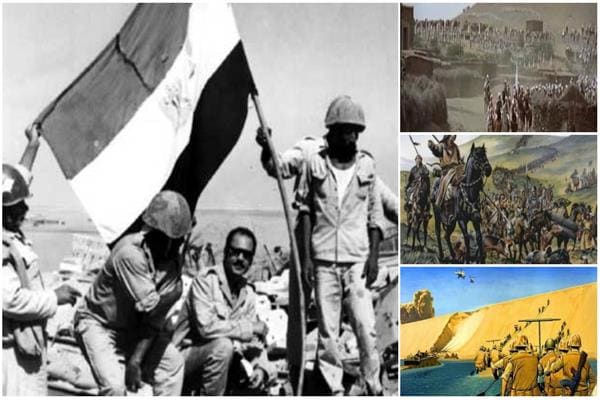As in past years during Ramadan, and especially ahead of the tenth day of this month, which is the anniversary of the outbreak of Egypt's and Syria's 1973 war with Israel, senior clerics in Egypt, chief of them Mufti Shawki 'Allam, stressed that Ramadan is the month of jihad, in which Islam's greatest victories took place.[1] The Egyptian press also celebrated Ramadan as the month of Islamic victories and conquests, mentioning the 7th century Battle of Badr and conquest of Mecca, the 8th century conquest of Andalusia and parts of southern France, the 12th century Battle of Hittin, the 13th century Battle of Ain Jalut and the 1973 war, among others.
The following are excerpts from these statements and articles:
Egyptian Mufti: The Greatest Victories In Islamic History Took Place In The Month Of Ramadan
On the 10th day of Ramadan, which occurred this year on May 15 and, as stated, is the anniversary of the outbreak of the 1973 war, Egypt's Mufti Shawki 'Allam devoted his daily Ramadan radio program to Islamic victories that took place during this month. He said: "Ramadan is a great month, the month of jihad. History demonstrates that no other month saw so many Islamic battles and victories as the month of Ramadan. These [victories] constitute another badge of honor for this month, in addition to the honor of [being the month] in which the Quran descended and [the Prophet] Muhammad had his first divine revelation. Ramadan has seen many victories, conquests and battles of decisive importance for the [Islamic] religion and nation. Chief among them are the Battle of Badr, on Ramadan 17, 2 AH [March 13, 624 CE]. On Ramadan 20, 8 AH, the conquest of Mecca took place, following which many people embraced Islam. During the time of the Mamluk kingdom, on Ramadan 25, 658 AH, Saif Al-Din Qutuz[2] and Zahir Baybars[3] managed to withstand the Mongol attacks in many parts of the Muslim world. In the modern era, our heroic forces won the Ramadan 10 war in 1973... Our mighty Egyptian army shattered the myth of the invincible Israeli army, as it was considered at the time, bringing this nation great honor with this victory."
The Mufti called to "compare this glorious [past] reality to the situation of many Muslims today. It is very sad," he said, "that this perception [of Ramadan] has now changed among many Muslims. Ramadan was once the month of action, struggle, jihad and sacrifice, but now it has become the month of leisure, sloth and love of food and sleep. This is a dangerous moral decline..."[4]

Shawki's Ramadan radio program on YouTube
Speaking about Ramadan on a television show, Shawki said: "The month of Ramadan is strongly associated with victory and with great deeds in human history and especially in Muslim history... During Ramadan, the individual is rebuilt... Fasting rebuilds him and gives him hope and strength. This is one of the factors [that contribute to] victory in any struggle we wage, in every area: at work, on the battlefield, and in any other domain. The individual needs to be rebuilt. Therefore it is not strange that all the great and influential victories in Muslim history took place during Ramadan..."[5]
Former Egyptian Mufti: In Islamic Culture, Ramadan Is The Month Of Jihad And Of Spreading Islam
On May 15 'Ali Gum'a, Egypt's former mufti and a member of Al-Azhar's Council of Senior Scholars, reposted on his Facebook page an article he had originally published in 2012, during his term as mufti. The article says: "Ramadan in Islamic culture was not only a month [devoted] to worshiping God and growing close to Allah the Almighty, but also a month of action and jihad in order to spread this mighty religion. When the soul grows stronger and the spirit transcends, it influences the body, which also becomes more powerful. What is the body if not a mirror of the spirit?" Later in the article Gum'a too reviews the Ramadan victories from the early Islamic period until the 1973 war.[6]

The article on Gum'a's Facebook page
Al-Azhar Campaign For Reviving The Ramadan Spirit Of Victory
Al-Azhar's Academy for Islamic Research launched a campaign of "marking the Ramadan 10 victories,"[7] titled "The Heroism of the Past and Aspirations for the Future." As part of the campaign preachers addressed the public in mosques, youth centers and culture centers across Egypt. The head of the academy, Nazir Muhammad, said that the campaign, lasting 10 days and involving 3,900 preachers, was aimed at "reviving the spirit of the Ramadan 10 victories and leveraging the Egyptians' victory to restore their spirit of persistence, action and productivity and encourage them to build the homeland and defend it."[8]
Articles In Egyptian Press: Ramadan Is The Month Of Victories And Great Conquests, Including Of Andalusia And Southern France
On May 7, the second day of Ramadan, the Egyptian government daily Al-Ahram published an article titled "Ramadan – the Month of Victories, from the Battle of Badr to the October [1973] War," which lists the conquest of Andalusia, as well as the conquest of parts of southern France in the 8th century Battle of Tours, among other victories.

Picture accompanying the article: a scene from the 1973 war
The article states that Ramadan is not just a month of tranquility and worship, but saw many significant Islamic victories and conquests. It mentions the Battle of Badr, which "lifted the Muslims' morale and strengthened their confidence in their ability to confront their Jewish enemies who conspired against them," as well as the conquest of Mecca in 630 CE, following which "the Muslims also conquered the Andalusian Peninsula" in 711. It also mentions the Battle of Tours, which took place after the Muslims had "conquered half of southern France and were [only] a few kilometers from Paris," and adds: "The Muslim army under the command of [the governor of Andalusia] 'Abd Al-Rahman Al-Ghafiqi encountered the European armies under Charles Martel... [The former] was killed in battle and the Islamic army then withdrew from the campaign. That was the Muslims' last attempt to conquer France." Also mentioned is the Battle of Amorium in 838 CE between the Byzantine Empire and the forces of the Abbasid Caliphate, the 1260 Battle of Ain Jalut, and the 1973 War. The last is described as "the greatest war" fought during Ramadan in the modern era, which "restored Egypt's military prestige, that had been lost in the war of June 5, 1967."[9]
A similar article, titled "From the Battle of Badr to the Ramadan 10 War – Eight Muslim Ramadan Victories," was posted on the Internet portal of the Egyptian weekly Akhbar Al-Yawm.[10]

From the article in the Akhbar Al-Yawm portal
Muhammad Foda, a columnist for the Al-Yawm Al-Sabi' daily, wrote under the title "Ramadan, the Month of Great Victories": "In the lives of nations and peoples there are unforgettable dates and days that cannot be overlooked or passed over without being marked and granted the honor they deserve. Among the important dates that are etched in our memory is Ramadan 10, which we mark today... This day is an important anniversary for all of us, on which we commemorate the great victory of 1973, which fills us with pride, honor and the sense that we preserved our reputation... Notably, however, this is not the only victory that the Arab and Muslim nations associate with Ramadan. When the month of Ramadan begins, we remember the mighty victory of the Prophet Muhammad in the Battle of Badr... the first important battle in Muslim history, in which 313 Muslims confronted 950 polytheists. This was the first armed clash between the Prophet Muhammad and the polytheists, and the Muslims triumphed... Subsequently there were other unforgettable days that are etched in the Muslims' memory and are associated with this honorable month. On Ramadan 20, 8 AH, the Muslims conquered Mecca and made it part of the Islamic state... [It seems to have been] decreed that the Muslims should always experience great victories during Ramadan. On Ramadan 26, November 27, 1188, the Muslims achieved another victory in the Battle of Hittin, under the victorious Sultan Salah Al-Din Al-Ayyoubi, who expelled the Crusaders from the east and liberated Jerusalem and most of the lands under Crusader occupation. The same month also saw the Battle of Ain Jalut... in which the Muslims achieved a resounding victory that put an end to the Mongols' ambitions in the region, especially since in this battle [the Mongols] lost their hold on Al-Sham, after which they withdrew from it completely.
"All this notwithstanding, the war of the 10th day of the blessed [month of] Ramadan [i.e., the 1973 war], during which the Egyptian army managed to cross the Suez Canal and destroy the Bar Lev Line, is the main battle associated [with Ramadan] in Arab memory. Today we celebrate the outcomes of this great victory, which was a sore blow to the Zionist arrogance... and had a great impact, paving the way to the Camp David Accords between Egypt and Israel, which put an end to the tension that had prevailed between the two countries..."[11]
[1] See MEMRI Special Dispatch No. 6104, Current And Former Egyptian Muftis: Ramadan Is The Month Of Victories And Conquests, July 13, 2015; Special Dispatch No. 4885, Egyptian Grand Mufti And Muslim Brotherhood General Guide: Ramadan Is The Month Of Jihad And Victories, August 14, 2012;
[2] The Mamluk Sultan who ruled Egypt for less than a year in 1259-1260.
[3] The Mamluk commander who defeated the Mongols in the Battle of Ain Jalut. Assassinated Qutuz in 1260 and took his place as Sultan.
[4] Youtube.com/watch?v=_mThtvS1wtI, May 15, 2018.
[5] Al-Ahram (Egypt), May 15, 2019.
[6] Facebook.com/DrAliGomaa, May 15, 2019. For further excerpts from the article, see Special Dispatch No. 6104, Current And Former Egyptian Muftis: Ramadan Is The Month Of Victories And Conquests, July 13, 2015.
[7] The 10th day of Ramadan is associated with multiple Islamic and Egyptian victories. For example, on Ramadan 10, 648 (December 10, 1250), the Ayyubid forces defeated the Crusaders led by Louis IX, King of France.
[8] Masrawy.com, May 14, 2019.
[9] Al-Ahram (Egypt), May 7, 2019.
[10] Akhbarelyom.com, May 14, 2019.
[11] Al-Yawm Al-Sabi' (Egypt), March 15, 2019.





